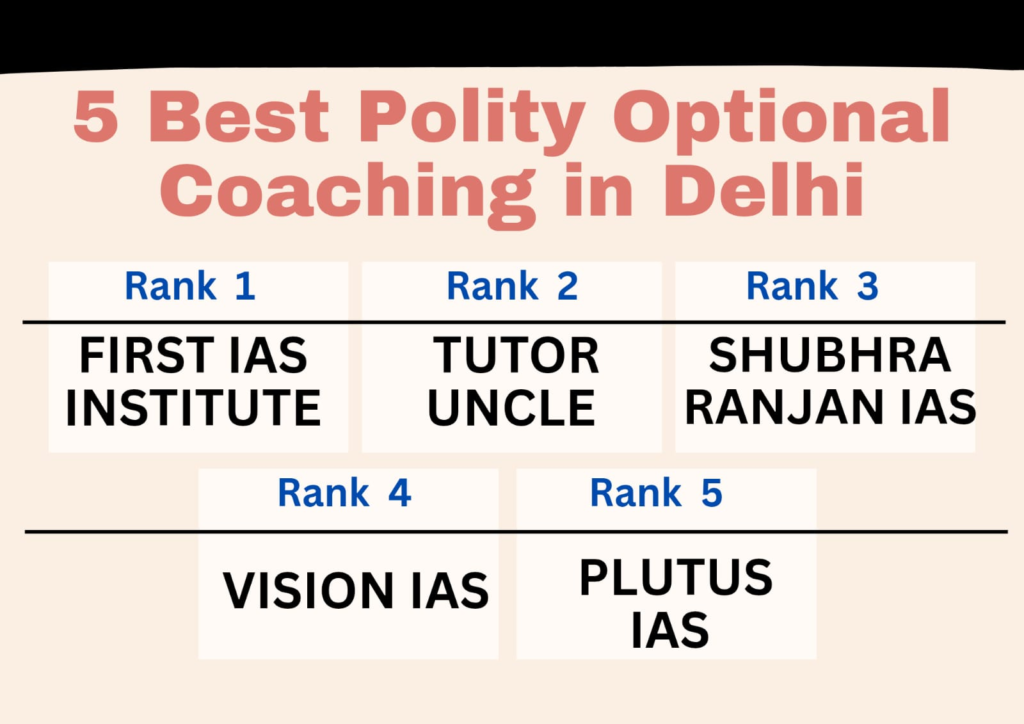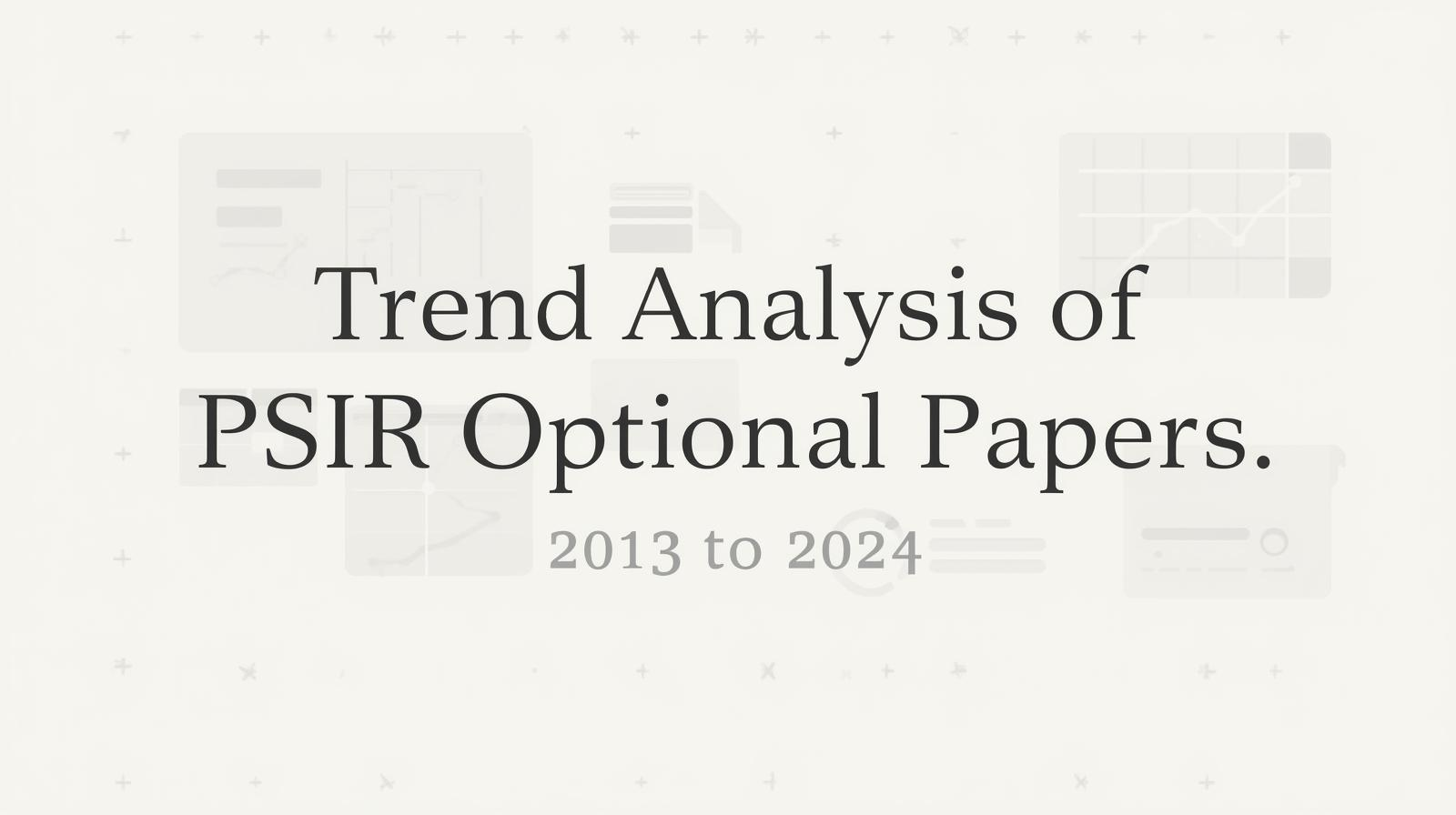For any serious aspirant of the UPSC Civil Services Examination, a deep dive into previous years’ question papers is not just a part of revision; it is a fundamental strategic exercise. This holds particularly true for an optional subject as dynamic as Political Science and International Relations (PSIR). Since the syllabus revision in 2013, the nature of questions asked in PSIR has undergone a significant transformation. Understanding this evolution is key to aligning one’s preparation with the expectations of the examiner.
This analysis dissects the trends in PSIR papers from 2013 up to the most recent examination, offering insights to help aspirants preparing for 2024 and beyond. The objective is to move beyond a superficial topic-wise breakdown and decode the deeper, qualitative shifts in the examiner’s mindset and the skills being tested.
Free Demo Class for PSIR Optional By – FIRST IAS INSTITUTE
Overall Macro-Trends Across Both Papers
Before delving into a section-wise analysis, it is crucial to recognize the overarching shifts that have defined the PSIR papers over the last decade.
- From Static to Dynamic: The most prominent trend is the decisive move away from direct, static, and predictable questions. While foundational knowledge remains essential, the focus has shifted to the application of that knowledge in contemporary contexts.
- Emphasis on Interlinkage: The papers increasingly reward candidates who can seamlessly connect concepts across different sections of the syllabus. Using a political theory from Paper 1 to analyze a foreign policy issue in Paper 2, for example, is a hallmark of a high-scoring answer.
- Primacy of Analysis over Description: Questions are less about “what” and more about “why,” “how,” and “critically evaluate.” The ability to form a coherent argument, substantiate it with evidence, and present a balanced perspective is now non-negotiable.
- Integration of Current Affairs: Current events are no longer confined to Paper 2. They are used as triggers for questions across the syllabus, especially in Indian Government and Politics, to test the candidate’s ability to link theoretical knowledge to real-world happenings.
Paper 1 Analysis: The Foundation of Theory and Thought
Paper 1, which covers Political Theory and Indian Politics, has evolved from a largely static paper to one that demands deep conceptual clarity and an ability to connect thought with practice.
Section A: Political Theory and Indian Political Thought
This section tests the theoretical foundations of a candidate. The trend here has been towards greater specificity and comparative analysis.
Political Theory
Initially, questions from this part were often direct, focusing on a single thinker’s main philosophy (e.g., “Discuss Aristotle’s theory of justice”). Over the years, the trend has shifted:
- Nuanced and Specific Questions: Instead of broad questions about a philosopher, the focus is now on a specific, and often more complex, aspect of their thought. For instance, a question might focus on Hannah Arendt’s conception of ‘power’ versus ‘violence’ rather than her work in general.
- Thematic and Comparative Analysis: There is a growing tendency to ask questions that cut across multiple thinkers or themes. Aspirants are expected to compare and contrast different viewpoints, for example, comparing the Lockean social contract with that of Rousseau, or analyzing the idea of ‘liberty’ from both liberal and Marxist perspectives.
- Contemporary Relevance: Core concepts like Justice, Equality, Rights, and Democracy are increasingly being linked to contemporary debates. A question on ‘justice’ might be framed in the context of affirmative action or global distributive justice.
Also Read: 5 Best Polity Optional Coaching in Delhi
Indian Political Thought (IPT)
This has been one of the most dynamic areas in Section A. Once a relatively predictable section, it has become a source of surprise.
- Beyond the Mainstream: While thinkers like Manu, Kautilya, and Gandhi remain important, UPSC has consistently expanded its focus to include figures like Dr. B.R. Ambedkar, Sri Aurobindo, and M.N. Roy. Questions on their specific contributions and ideologies have become more frequent.
- Emphasis on Comparative Study: The most significant trend here is the rise of comparative questions, particularly those juxtaposing the ideas of Gandhi and Ambedkar. Understanding their points of convergence and divergence on issues like caste, democracy, and nationalism is now critical.
Section B: Indian Government and Politics (IGP)
This section has witnessed the most dramatic shift towards a dynamic and current affairs-based approach. Rote learning of constitutional articles is no longer sufficient.
- From Constitution to Governance: The focus has moved from the text of the Constitution to its actual functioning. Questions are less about the ‘powers of the President’ and more about the ‘changing role of the President in the context of coalition politics’. Topics like federalism, judicial review, and parliamentary proceedings are tested through the prism of recent controversies and events.
- The Judiciary as a Central Theme: The judiciary, particularly the Supreme Court, has become a consistent focus. Questions on judicial activism, the basic structure doctrine, and key judgments related to fundamental rights appear frequently, almost always tied to a recent verdict or a public debate.
- Thematic and Cross-cutting Issues: There is a clear trend of asking broad, thematic questions that require knowledge from multiple chapters. Topics like identity politics, secularism, challenges to national integration, and the political economy of development require a holistic understanding of the Indian political landscape, not just isolated factual knowledge.
Paper 2 Analysis: The Arena of Global and Regional Politics
Paper 2 has always been dynamic, but the level of analytical depth and strategic thinking now required has increased substantially.
Section A: Comparative Politics and International Relations
This section requires a strong grasp of theory and the ability to apply it to the global context.
Comparative Politics
This remains a challenging area for many. The trend has been to move away from comparing specific constitutions to analyzing broader political processes.
- Thematic Focus: Questions are now more thematic, focusing on concepts like democratization in developing countries, the changing nature of the state in the era of globalization, or the role of civil society.
- Application-Based Questions: Aspirants are expected to use their knowledge of different political systems to answer these thematic questions, drawing examples from both developed and developing nations.

International Relations Theories and Concepts
This is the theoretical core of Paper 2, and its application has become paramount.
- Theory Application is Key: Questions are rarely about just explaining a theory (e.g., “What is Realism?”). Instead, they demand the application of these theories to analyze contemporary global events, for instance, “Analyze the Russia-Ukraine conflict from a Realist and a Constructivist perspective.”
- Beyond Realism and Liberalism: While the classical theories remain important, there is an increasing, albeit slow, trend of touching upon alternative theories like Constructivism and the Feminist perspective in IR, signaling a need for a broader theoretical toolkit.
Section B: India and the World
This is the most dynamic section of the entire syllabus, where knowledge is often outdated within months.
- Primacy of Contemporary Foreign Policy: While a historical understanding of bilateral relations is necessary for context, the questions are almost entirely focused on developments over the last few years. The static part serves only as a foundation for analyzing the present.
- Shifting Geographic Focus: While questions on major powers (USA, China, Russia) and the immediate neighborhood are perennial, there is a clear trend towards exploring India’s engagement with other regions like Africa, Southeast Asia (ASEAN), Central Asia, and the Indo-Pacific.
- From Bilateral Relations to Strategic Issues: The focus has broadened from simple bilateral relations to India’s strategic calculations, its role in multilateral forums (like the Quad, SCO, and G20), its approach to global issues like climate change and maritime security, and its ambition of becoming a ‘leading power’. Questions require a critical evaluation of India’s foreign policy choices, not just a description of them.
Strategic Implications for Aspirants Preparing for 2024 and Beyond
This decade-long trend analysis points to several clear strategic imperatives for aspirants:
- Prioritize Conceptual Clarity: Rote memorization of facts and thinkers is a flawed strategy. Invest time in understanding the core concepts and the internal logic of each theory.
- Master the Art of Interlinkage: Actively practice connecting topics. While studying the judiciary in Paper 1B, think about how it reflects the principle of separation of powers (Paper 1A). While studying India-US relations (Paper 2B), apply IR theories (Paper 2A).
- Develop a ‘Current Affairs Plus’ Approach: Do not just read the news. Analyze it. For every major national or international event, ask yourself: “How does this relate to my PSIR syllabus?” Maintain dedicated notes linking current events to specific topics.
- Answer Writing is Everything: The evolving nature of the questions means that your ability to structure an analytical and multi-dimensional answer is more important than ever. Regular practice, especially with questions that demand critical evaluation, is the only way to develop this skill.
Conclusion
The Political Science and International Relations optional is no longer a subject that can be mastered by simply reading a few standard books. The clear trend from 2013 to the present is a move towards a more intellectually demanding, analytical, and application-oriented examination. The paper rewards candidates who think critically, connect disparate ideas, and engage with the contemporary world through a theoretical lens. For aspirants of 2024 and beyond, success will depend not on how much they know, but on how well they can apply what they know to answer the precise, and often complex, questions that the UPSC now prefers to ask.
Also Read: 5 Best Polity Optional Coaching in Delhi

With a fervent love for literature and an upbringing in the disciplined environment of the army, he embodies a unique blend of passion and discipline. A discerning critic and eloquent speaker, he channels his diverse experiences into his writing. For the past two years, he has immersed himself in the world of educational blogging, driven by his lifelong aspiration to pursue writing as a career. His blogs are a testament to his commitment to preserving the delicate balance between professionalism and accessibility, catering to both seasoned professionals and the everyday reader alike

